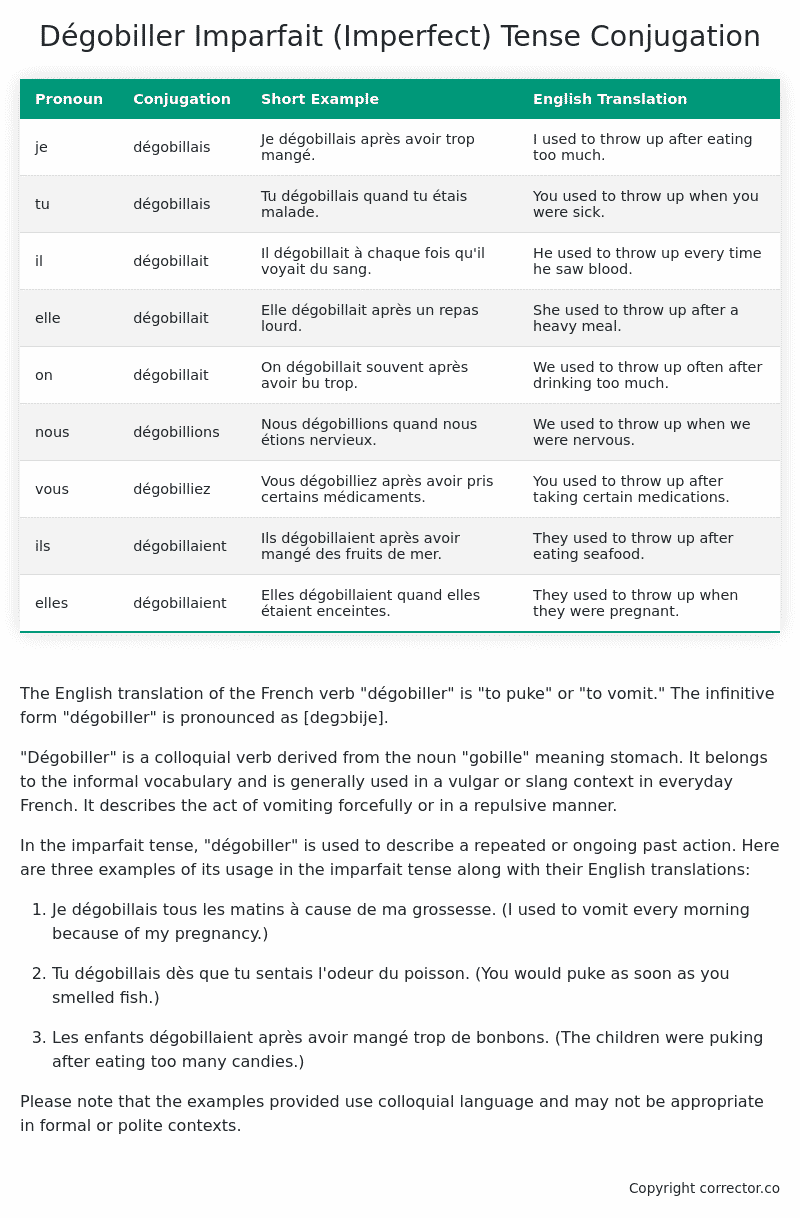Imparfait (Imperfect) Tense Conjugation of the French Verb dégobiller
Introduction to the verb dégobiller
The English translation of the French verb “dégobiller” is “to puke” or “to vomit.” The infinitive form “dégobiller” is pronounced as [deɡɔbije].
“Dégobiller” is a colloquial verb derived from the noun “gobille” meaning stomach. It belongs to the informal vocabulary and is generally used in a vulgar or slang context in everyday French. It describes the act of vomiting forcefully or in a repulsive manner.
In the imparfait tense, “dégobiller” is used to describe a repeated or ongoing past action. Here are three examples of its usage in the imparfait tense along with their English translations:
-
Je dégobillais tous les matins à cause de ma grossesse.
(I used to vomit every morning because of my pregnancy.) -
Tu dégobillais dès que tu sentais l’odeur du poisson.
(You would puke as soon as you smelled fish.) -
Les enfants dégobillaient après avoir mangé trop de bonbons.
(The children were puking after eating too many candies.)
Please note that the examples provided use colloquial language and may not be appropriate in formal or polite contexts.
Table of the Imparfait (Imperfect) Tense Conjugation of dégobiller
| Pronoun | Conjugation | Short Example | English Translation |
|---|---|---|---|
| je | dégobillais | Je dégobillais après avoir trop mangé. | I used to throw up after eating too much. |
| tu | dégobillais | Tu dégobillais quand tu étais malade. | You used to throw up when you were sick. |
| il | dégobillait | Il dégobillait à chaque fois qu’il voyait du sang. | He used to throw up every time he saw blood. |
| elle | dégobillait | Elle dégobillait après un repas lourd. | She used to throw up after a heavy meal. |
| on | dégobillait | On dégobillait souvent après avoir bu trop. | We used to throw up often after drinking too much. |
| nous | dégobillions | Nous dégobillions quand nous étions nervieux. | We used to throw up when we were nervous. |
| vous | dégobilliez | Vous dégobilliez après avoir pris certains médicaments. | You used to throw up after taking certain medications. |
| ils | dégobillaient | Ils dégobillaient après avoir mangé des fruits de mer. | They used to throw up after eating seafood. |
| elles | dégobillaient | Elles dégobillaient quand elles étaient enceintes. | They used to throw up when they were pregnant. |
Other Conjugations for Dégobiller.
Le Present (Present Tense) Conjugation of the French Verb dégobiller
Imparfait (Imperfect) Tense Conjugation of the French Verb dégobiller (You’re reading it right now!)
Passé Simple (Simple Past) Tense Conjugation of the French Verb dégobiller
Passé Composé (Present Perfect) Tense Conjugation of the French Verb dégobiller
Futur Simple (Simple Future) Tense Conjugation of the French Verb dégobiller
Futur Proche (Near Future) Tense Conjugation of the French Verb dégobiller
Plus-que-parfait (Pluperfect) Tense Conjugation of the French Verb dégobiller
Passé Antérieur (Past Anterior) Tense Conjugation of the French Verb dégobiller
Futur Antérieur (Future Anterior) Tense Conjugation of the French Verb dégobiller
Subjonctif Présent (Subjunctive Present) Tense Conjugation of the French Verb dégobiller
Subjonctif Passé (Subjunctive Past) Tense Conjugation of the French Verb dégobiller
Subjonctif Imparfait (Subjunctive Imperfect) Tense Conjugation of the French Verb dégobiller
Subjonctif Plus-que-parfait (Subjunctive Pluperfect) Tense Conjugation of the French Verb dégobiller
Conditionnel Présent (Conditional Present) Tense Conjugation of the French Verb dégobiller
Conditionnel Passé (Conditional Past) Tense Conjugation of the French Verb dégobiller
Conditionnel Passé II (Conditional Past II) Tense Conjugation of the French Verb dégobiller
L’impératif Présent (Imperative Present) Tense Conjugation of the French Verb dégobiller
L’impératif Passé (Imperative Past) Tense Conjugation of the French Verb dégobiller
L’infinitif Présent (Infinitive Present) Tense Conjugation of the French Verb dégobiller
L’infinitif Passé (Infinitive Past) Tense Conjugation of the French Verb dégobiller
Le Participe Présent (Present Participle) Tense Conjugation of the French Verb dégobiller
Le Participe Passé (Past Participle) Tense Conjugation of the French Verb dégobiller
Struggling with French verbs or the language in general? Why not use our free French Grammar Checker – no registration required!
Get a FREE Download Study Sheet of this Conjugation 🔥
Simply right click the image below, click “save image” and get your free reference for the dégobiller imparfait tense conjugation!

Dégobiller – About the French Imparfait Tense
NOTE: To take a deep dive into all the French tenses then see our article on Mastering French Tense Conjugation.
Formation of the Imparfait Tense
For regular -er verbs:
For regular -ir verbs
For regular -re verbs
Common Everyday Usage Patterns
Description of Past Habits
Background Information
Mental and Emotional States
It’s employed to express emotions, thoughts, or physical sensations in the past. For example: “J’étais content quand il est arrivé.” (I was happy when he arrived.)
Ongoing Actions
Points to Note About the Imparfait Tense
Passé Composé vs. Imparfait
Conditional
Si Clauses
Narration
I hope you enjoyed this article on the verb dégobiller. Still in a learning mood? Check out another TOTALLY random French verb imparfait conjugation!


